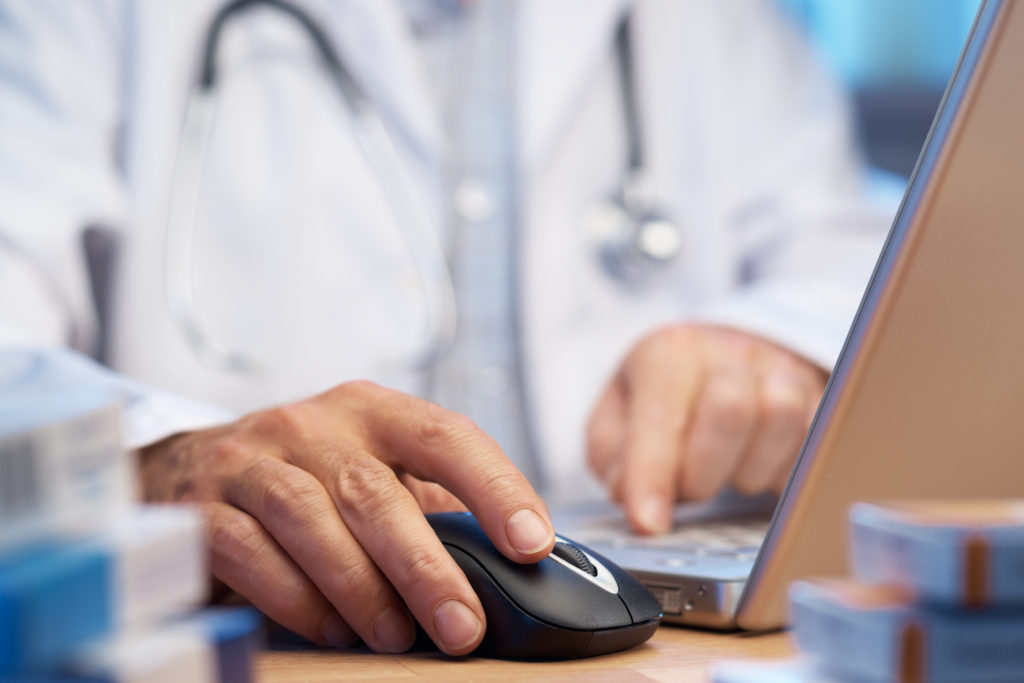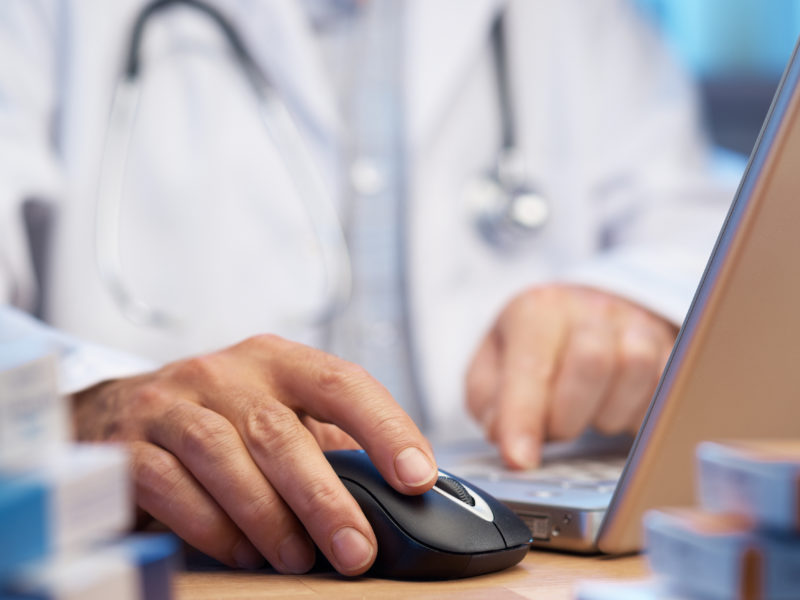Fighting Back Against COVID-19 Misinformation on the Web
Fighting Back Against COVID-19 Misinformation on the Web https://pediatricsnationwide.org/wp-content/uploads/2020/05/AdobeStock_18121397-1024x683.jpg 1024 683 David Stukus, MD David Stukus, MD https://pediatricsnationwide.org/wp-content/uploads/2021/03/David-Stukus.jpg- May 19, 2020
- David Stukus, MD

Misinformation on the internet is nothing new, but in the age of COVID-19, it is more important than ever for health care experts to speak up for evidence-based care.
Misinformation on the internet has been rampant for years. From antivaxxers and naturopaths to flat earthers and others, misinformation has always infiltrated online searches and only continues to grow through the use of social media.
The misinformation surrounding COVID-19 has been exceptional. In fact, the World Health Organization coined the term “infodemic” in response to all the misinformation being spread about COVID-19. Here are just a handful of the headlines that exemplify the misinformation problem:
- Coronavirus Could Spread Through Farts
- Wearing a Mask Could Cause Carbon Dioxide Poisoning and Make You Sick
- Bill Gates Is Responsible for Coronavirus
- 5G Towers Are Causing Coronavirus
- Coronavirus Spread by Houseflies
None of these are true.
Further misinformation about COVID-19 has been spread by world leaders or people with a lot of influence citing small studies or basing policy decisions on very little evidence.
For example, the idea that non-steroidal anti-inflammatory medications could make COVID-19 more severe was based on a single line in an related correspondence that noted a potential correlation. Further evidence has shown this not to be the case, but this was after major headlines declared it a danger. This misinformation has stuck around and caused many families and patients undue worry.
In another example, the President of the United States made remarks (later he said they were intended to be sarcastic) that ingesting disinfectant or bringing light into the body could fight or prevent COVID-19. Ingesting bleach, or miracle mineral supplement (MMS), which is also bleach, has been touted a pseudoscientific “cure all” by fringe groups for years. During COVID-19, calls to poison control centers have risen due to people drinking bleach and health care officials across the country had to issue counter campaigns against ingesting disinfectants.
The drug hydroxychloroquine and remdesivir have been touted as promising treatments for COVID-19, but with little evidence to date to support those claims. Anecdotes and small studies with limited power are being given a lot of weight – but we need to be patient and wait for properly conducted trials to offer evidence of benefit. Recent studies evaluating hydroxychloroquine have shown little benefit and also significant risks associated with treatment of COVID-19. It is currently only recommended for use as part of a clinical trial or in the hospital setting. Remdesivir is currently under investigation with limited peer-reviewed published data despite the FDA fast track approval for use. It’s simply too soon to make sweeping claims about either of these drugs.
Why Is Misinformation Such a Problem?
It’s easy to say, “don’t get your health care information from the internet.” Or “talk to your doctor.” But that’s simply not the reality of what our patients and families are doing and this also would be counterproductive and disrespectful.
Most people are going online to look for medical information. And while most people prefer content from experts, most medical professionals are not engaged in communicating medical information in a meaningful way online. It’s up to us to meet them where they are, anticipate concerns, and proactively address the problems with misinformation online.
Recognizing Biases
Some of the factors that have led to this epidemic of misinformation involve how we gather and interpret information online.
We all have cognitive biases – preconceived notions about the information that we are seeking out. If we remain unaware of this, it can lead to confirmation bias – sticking with information that confirms our preconceived ideas. Recency bias, the tendency to weigh the latest information more heavily than older data, can also affect a person’s perception of reality.
To further complicate matters, when you search for information online, the stories that are promoted are the most sensationalized and emotional. This feeds into the feeling of anxiety and creates a false balance or flawed understanding of reality. There is an unequal balance of information and this can alter anyone’s perception of reality. As medical professionals, we have perspective surrounding the spectrum of disease and normal health as well as risk and this all too often differs greatly from what our patients may perceive.
We need to be able to recognize this in our patients and do our part to support them as they navigate health information.
Understanding Levels of Evidence
First, we can help patients and families understand the differences in types of evidence.
The levels of evidence, from strongest to weakest are:
- Meta-analyses and systematic reviews
- Randomized controlled trials
- Cohort studies
- Case-control studies
- Cross-sectional studies
- Animal trials and in vitro studies
- Case reports, opinion papers and letters
We can work this into the conversation when we’re talking about what a family has read online about a specific topic or treatment. Let people know that the plural of anecdote is not data. Personal stories are important, but they don’t provide proof, or confirmation. Important details are often lacking.
You might be surprised about how many people take medical advice from people online – people who have no medical backgrounds. Medical professionals know that you shouldn’t give specific, individual medical advice on social media, but unqualified individuals do it all the time in groups, forums and personal pages.
Importantly, we need to recognize what “research” means to our families. When someone says, “I’ve done my research,” this often means:
- They have preconceived notions
- They use online search engines and find information that supports their preconceived notions
- Information that counters their beliefs may be ignored or deemed not credible
- They gain confidence that their online searches confirmed their own beliefs
This behavior can be deadly. In one case, a mom had taken her child to the pediatrician. Her child tested positive for influenza and their doctor recommended Tamiflu. Once the mom got home, she posted this online and asked for natural remedies to use instead. She received multiple specific recommendations from unqualified individuals, including foods and alternative therapies, and did not follow her pediatrician’s recommendations. Tragically, her son ultimately died from influenza.
Misinformation dilutes credible information, disregards facts, encourages families to forgo proven therapies for false promises, costs a lot of money and leads to distrust of actual experts.
How Can Health Care Providers Help?
We need to change the way we interact with patients and families. We should strive to go back to trusted relationships where we can address their concerns through conversation. Patients and their families are seeking health information online, for COVID-19 and everything else, because they are scared. They want to protect themselves and their families. They want to do something.
One tool that is essential to building a good doctor-patient relationship is shared decision making: We should understand the options, risks and evidence for the treatments we are recommending. As we present them to the patients, we should seek to understand the patient’s preferences and values. For example, do they want to reduce the possibility of any asthma exacerbation or minimize side effects from treatment? There’s a balance, and we can often find that.
By helping patients make evidence-based decisions about their treatment, we empower them and become a trusted source of information.
Through our relationships, we can teach people how to identify and combat misinformation. Tactfully educate families with the following steps:
- Stop and take a moment to breathe, reflect and slow down
- Investigate the source to see if it’s qualified to make such claims
- Identify if the source is selling products or services related to their claim, which is a conflict of interest
- Trace claims, quotes and media to the original context
- Think twice before sharing information with others and contributing to the spread of misinformation
To quote Carl Sagan, “Extraordinary claims require extraordinary evidence.” Arming our patients and families with the tools to ascertain good information will help them make informed decisions surrounding their health.
Listen to the full Grand Rounds presentation from May 7, 2020.
About the author
Dr. Stukus is director of the Complex Asthma Clinic and a physician in the Section of Allergy/Immunology at Nationwide Children’s Hospital. He is also assistant professor of Pediatrics at The Ohio State University College of Medicine. His clinical and research interests focus on asthma and food allergies, especially improving education and adherence for patients and families. As part of his research, Dr. Stukus has created novel technology and educational tools using mobile health apps to improve the care of patients, for which he was recognized with the Nationwide Children’s Hospital Department of Pediatrics Junior Faculty Award for Innovation in November 2013. Dr. Stukus has been an active member of the medical advisory team for Kids with Food Allergies since 2009 and was elected to the Board of Directors for the Asthma and Allergy Foundation of America in 2014.
-
David Stukus, MDhttps://pediatricsnationwide.org/author/david-stukus-md/
-
David Stukus, MDhttps://pediatricsnationwide.org/author/david-stukus-md/
-
David Stukus, MDhttps://pediatricsnationwide.org/author/david-stukus-md/February 25, 2020
- Post Tags:
- Allergy and Immunology
- General Pediatrics
- Posted In:
- Features








